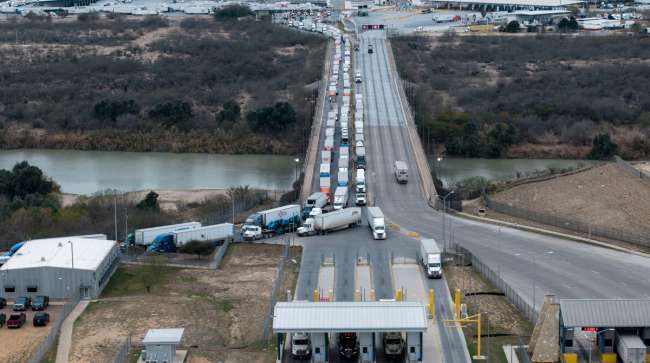Trucks wait in line to enter the U.S. at the World Trade Bridge port of entry on the U.S.-Mexico border in Laredo, Texas. (Cheney Orr/Bloomberg News)
Amid the Trump administration’s back-and-forth on implementing and then pausing tariffs on U.S. trade partners, Customs and Border Protection announced it has collected $8.66 billion from a handful of tariffs that took effect in February.
In an April 8 release, CBP outlined the following duties collected and paid to the Treasury Department since President Donald Trump began issuing executive orders and proclamations as part of his escalating tariff battle with the nation’s trading partners:
- $4.8 billion from duties imposed on China for what President Trump in a Feb. 1 executive order said was a response to the synthetic opioid supply coming from the country;
- $2 billion for goods entering the U.S. at the southern border with Mexico, via executive order;
- $1 billion from aluminum and steel imports from a variety of countries, via a Trump proclamation;
- $861 million from duties imposed against Canada in response to what Trump in a Feb. 1 executive order said was the flow of illicit drugs across the U.S. northern border.
The federal government’s use of tariffs to address what are viewed as unfair trade practices and the overseas drug trade has been a hallmark of Trump’s second administration.
“Serving on America’s frontline, CBP strictly enforces all laws and presidential directives to secure our economic sovereignty and is fully equipped and ready to collect duties owed for goods subject to tariff and small packages,” CBP stated.
Trump in an April 2 Rose Garden ceremony announced a fresh round of tariffs and declared the day — which he dubbed “Liberation Day” — as a date that “will be forever remembered as the day American industry was reborn, the day America’s destiny was reclaimed, and the day that we began to make America wealthy again.”
On April 9, Trump authorized a 90-day pause on some tariffs and “substantially lowered” reciprocal tariffs. In a social media post, Trump said the move was compelled after 75 nations contacted various branches of the federal government — including the Treasury and Commerce departments — to negotiate solutions.
Trump did not suspend any levies against China, which has so far matched Trump’s aggression in escalating duties against goods moving between the two countries.
Customs duties are initially deposited into the Treasury’s so-called General Fund. The agency refers to the fund as “America’s Checkbook” since it is used to cover costs for daily and long-term U.S. government operations.
CBP said it is “working closely with other government agencies to implement ‘Liberation Day’ announcements and will continue to provide detailed guidance to promote compliance and uniform enforcement across the nation.”
As of April 10, two more tariffs remained scheduled to take effect:
- May 2 — new duties on goods valued under $800 from China and Hong Kong that no longer will be deemed duty-free if not sent through international mail.
- June 1 — a higher $50 duty rate for China and Hong Kong on lower-valued goods under $800 sent to the U.S. through the international postal network.






